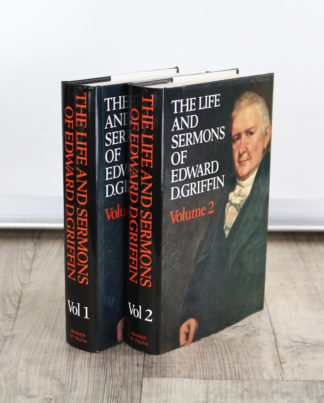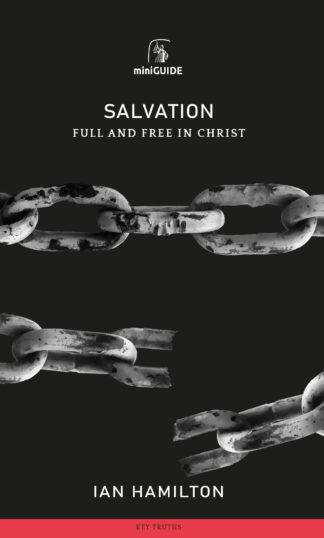God Takes Salvation Into His Own Hands
The following, with minor alterations, is taken from Vol. 2 of Sermons by the late Edward Griffin (1770-1837), 1839. These volumes contain an excellent memoir by William B. Sprague.
* * *
According to the plan of grace revealed in the Gospel, God has taken the work of salvation into his own hands. The great design originated in the mind of God. In the ages of eternity it arose out of his own self-moving goodness, without the counsel of any creature — without the intercession of any creature — without respect to the merits of any creature. It was his own purpose — his own favourite choice — induced by nothing but a regard to his own glory and compassion for a ruined world. Having conceived the design, it was he that prepared the means of its execution. He organized the whole plan without the counselor solicitation of any creature. Eternal ages before creatures had existence, the covenant of redemption between the sacred Persons was formed, in which every circumstance relating to the salvation of the world was settled. From the resources which were found in the ever-blessed Trinity, the means of atonement and redemption were derived. The second Person stood forth and offered himself to die in a human form to expiate human guilt. The offer was accepted, and in return a numerous seed were promised him, whose names were ‘written in the book of life.’ The plan of redemption thus settled, these lower worlds were formed. Man was placed on the earth. He fell. Immediately an intimation of the great purpose was made to him. The design was still further disclosed during the lapse of following ages. It was known on earth that God would redeem his people; but so far from man’s being consulted in regard to this design, he knew not the means nor the manner of its accomplishment. In the fulness of time the Son of God appeared on earth ‘to put away sin by the sacrifice of himself’; and by once offering himself ‘to bear the sins of many’, he brought in ‘everlasting righteousness’ and ‘perfected forever them that are sanctified’. He arose from the dead for their justification, and in his own release from the sins he had borne, received the seal of their acquittal and salvation.
All this was done by God, independently of creatures. And now the charge of applying to the promised seed the benefits of redemption, was committed to Christ, who, with the consent of the Father, sent out the Holy Spirit to bring invitations to a universal world, and to subdue as many as the Father had given him. The work of enlightening the world by the preaching of the gospel, was taken into the hands of the blessed Trinity, who employed in the work such human instruments as wisdom saw fit; but it was God and not man who undertook to provide that the gospel should be preached to every nation under heaven. It was the blessed Trinity who created the Christian Church, and undertook the charge of it, and settled the point that it should be supported and enlarged, until its overflowing glory should fill the world. The management of the Church and all her interests — her preservation, advancement, and final triumph — the whole has God himself provided for without the counsel of creatures. His purpose is fixed and will not change. She shall live; she shall be enlarged; the gates of hell shall not prevail; her overflowing glory shall fill the earth as the waters fill the sea. In like manner God has taken into his own hands the salvation of every individual of his elect. It belongs to him to awaken the conscience, which never would be done if not done by him. It belongs to him to convince of sin, which never would be done if not done by him. It belongs to him to subdue the resistance which the heart is sure to make to the calls of the Spirit — resistance which, if he did not subdue it, would forever prevail. And after he has overcome the sinner by superior strength and changed the heart of stone to flesh, it belongs to him to carry on the work of sanctification. This also he has taken into his own hands. It is his province to subdue the remaining corruptions, to deliver from the wiles of Satan and the snares of the world, to clear all obstacles from the Christian’s path and to bear him in his arms all the way to heaven. The work is all the Lord’s undertaken from love exhaustless and invincible, and as the Lord liveth it will be accomplished.
That God has taken the work of delivering his people into his own hands, is the only foundation of human hope. This doctrine of divine agency and human dependence, though it is opposed by all that is proud in man, by all his love of independence, by all his hatred of divine government, is yet one of the sweetest doctrines of the Christian system. While the world complain that their salvation is dependent on the will of God, they may be very sincere, but really they know not what they do; for they murmur against that which is the only foundation of human hope. Had not God taken the salvation of men into his own hands, to begin, to carry on, and to perfect it according to his sovereign pleasure, not a fallen creature would ever have reached the kingdom of heaven. There is not a Christian on earth who could have atoned for his own sins, or conceived the wonderful plan of atonement by the death of an incarnate God. Had not God contrived and executed this plan, no provision could have been made for the salvation of men. There is not a Christian on earth who could have secured the privilege of being born and brought up under the light of the gospel, had not God ordered his lot in this manner. Not a Christian on earth would ever have awakened himself from the slumbers of sinful repose would have poured upon his own conscience the convincing light of truth, would have subdued his own resistance and translated himself from darkness into marvellous light. The best Christian on earth, with all his attainments, would never overcome another sin, would never gain another triumph over the world, would never demolish another idol, would never escape another snare of Satan, but for the power of God. Sustaining the combined assaults of earth and hell, what can he do? An infant puling in its mother’s arms, might as well attempt to hurl the sun from his orbit and turn all the angels out of heaven, as a poor feeble creature, in his own strength, to overcome two worlds with his own house divided against itself. His only hope is in God. At what time he is afraid he can only trust in his eternal rock. Surrounded by armies stronger than he, with all their weapons pointed at his heart, like Jehoshaphat he cries out to God for aid. Enclosing in his own bosom a host of rebels, constantly disposed to mutiny and to tumult, with no check upon them but guards which are furnished from heaven, what could he do if the heavenly aid were withdrawn? Beset from without and from within, he must soon be swallowed up if the God of his salvation did not appear for him. Finding every inch of ground disputed by the enemy, and his own mind revolting from the contest, what hope can he have but in the God of the armies of Israel ?
The Christian who feels his own weakness, and discerns the number and power of the enemy, will resort to this delightful truth as the only ground of hope, ‘The salvation of the righteous is of the Lord’; and a thousand times will he say, with an eye lifted to heaven and fixed as marble, ‘My soul, wait thou only upon God; for my expectation is from him.’ Knowing that his case is desperate unless God plucks him from the midst of a thousand deaths; perceiving that an attempt in his own strength to break through all the difficulties between him and heaven is altogether hopeless; sensible that he cannot take a single step alone, that without Christ he can do nothing; he finds it sweet to lay his soul over on God, by a distinct and deliberate act to deliver into the hands of Christ all that he holds dear for time and eternity, and to commit to him every part of his salvation. Sweet is the act of taking the glorious perfections of God for the pledges and agents of his salvation — to reach out and take hold of omnipotence — to feel a sense which it is not easy to express, but which may be indistinctly signified by saying, he feels embosomed in God, and sheltered there from every danger and enemy.
That God has taken the salvation of individuals into his own hands, will excite no uneasiness except in those who would rather trust themselves than God, who would rather reign themselves than that God should reign. But remove from real Christians this foundation, and all their hopes and efforts will sink into motionless despair. The only encouragement they have to ‘work out’ their ‘own salvation’, is that ‘God — worketh in’ them.
From this doctrine is also drawn all our encouragement in relation to the interests of the general Church. Who shall protect her from all her enemies? Every pious minister and every Christian yields the point, and concludes that if God does not support his own cause in the world, he must sit down in tears and give up all for lost. When we look abroad into the streets and see them filled with pollution; when we see the mixed multitude driving furiously after the world, without a care for God or their souls; the most affecting events, the most solemn judgments unable to rouse them to a serious thought; when we behold those who profess the name of Christ buried deep in the world as those who have been long dead — with no seeming care for the kingdom of him who purchased them with his blood; when we behold the ministration of the word produce no effects, and not a soul under all the pleadings of divine love moved to inquire the way to heaven; the eye of benevolence, filled with tears, looks round and inquires, Is there no redress? The heart of benevolence, bleeding at every pore and trembling for the ark of God, can seize on nothing to sustain its hopes but the knowledge held out in the truth that the work of saving men is God’s own work. The cause of religion is God’s own cause. I know that not another soul will ever be converted in this congregation unless it be accomplished by the power of God. After human efforts have spent themselves to no purpose, this one consolation is left: the work of saving these poor perishing souls who are going down to destruction from our land by millions — the work of preserving religion in this congregation is taken into God’s own hands. There we must leave it.
Come, you parents, who anxiously look on the children of your love, whom you have brought into a state of depravity and condemnation, but whom you know that you cannot restore: come, bring them and leave them here. After all your tender concern what will become of them after death, after all your prayers and tears and discouragements, bring them in your arms and leave them here. You and your whole families may here repose. You exceedingly desire the salvation of your children, but you know that you cannot save them. Will these children be saved? The decision of this question is reserved for infinite wisdom and love. You have confidence in God that he will do right. You love him better than you do your child. You put the work of saving your children over upon him and calmly resign them into his hands. Do you not now feel a substantial peace in reflecting that God has taken the whole work of saving men into his own hands? While your children are clustering around you, say, Christian parent, would you for a thousand worlds change this blessed truth?
Come you ministers, who seem to labour in vain and spend your strength for nought — who often look around on the people of your charge and of your heart, and know that you shall soon meet them at the bar of God, and yet see most of them buried in the world and sin: come hither, after all your distresses and discouragements — after your anxious days and restless nights; come, for here a little light begins to dawn — it brightens — it breaks upon the soul with glorious effulgence. The success of your ministry and the saving the people committed to your care, is taken into God’s own hands. It is his own work; it is his own cause: with him you may safely leave it.
You who bear upon your hearts the general interests of the Church, who have been long praying for the kingdom of Christ to come: here you also may settle and rest. The work of preserving and enlarging the Church and consummating her glory, is taken into God’s own hands. He who set up this object without consulting the wishes or opinions of men who has placed his heart upon it as his own favorite interest, as the chosen means of spreading his glory before the inhabitants of all worlds, who for this purpose created and redeemed, preserves and governs the earth — he will take care of the Church, and as sure as he is possessed of omnipotence, will bring to its aid sufficient strength to advance it to perfection and glory.
Here also is the only hope of unrenewed sinners. Come, you multitude of impenitent men, and contemplate the only chance which remains for your salvation. Unless that God whom you have made your enemy by wicked works, undertakes for you, all heaven and earth cannot save you. Unless that God whom you daily disobey, to whom you refuse to cry for relief, unless he in mercy to your poor perishing souls, begins and carries on and completes your salvation, you are undone for eternity. Will you any longer treat your only helper with so much neglect and abuse? Remember that you are in his hands. One frown from him and you are plunged into eternal woe; one smile from him and you live forever. O realize your condition. Hasten to cast yourselves at his feet. ‘Seek the Lord while he may be found; call upon him while he is near. Let the wicked forsake his way, and the unrighteous man his thoughts; and let him return unto the Lord, and he will have mercy upon him, and to our God, for he will abundantly pardon.’
Of Further Interest

Life & Sermons Of Edward D. Griffin
2 Volume Set
Description
The following, with minor alterations, is taken from Vol. 2 of Sermons by the late Edward Griffin (1770-1837), 1839. These volumes contain an excellent memoir by William B. Sprague. * * * According to the plan of grace revealed in the Gospel, God has taken the work of salvation into his own hands. The great […]

Saved By Grace Alone
Sermons on Ezekiel 36:16-36
Description
The following, with minor alterations, is taken from Vol. 2 of Sermons by the late Edward Griffin (1770-1837), 1839. These volumes contain an excellent memoir by William B. Sprague. * * * According to the plan of grace revealed in the Gospel, God has taken the work of salvation into his own hands. The great […]

Salvation
Full and Free in Christ
Description
The following, with minor alterations, is taken from Vol. 2 of Sermons by the late Edward Griffin (1770-1837), 1839. These volumes contain an excellent memoir by William B. Sprague. * * * According to the plan of grace revealed in the Gospel, God has taken the work of salvation into his own hands. The great […]
Latest Articles
Finished!: A Message for Easter 28 March 2024
Think about someone being selected and sent to do an especially difficult job. Some major crisis has arisen, or some massive problem needs to be tackled, and it requires the knowledge, the experience, the skill-set, the leadership that they so remarkably possess. It was like that with Jesus. Entrusted to him by God the Father […]
Every Christian a Publisher! 27 February 2024
The following article appeared in Issue 291 of the Banner Magazine, dated December 1987. ‘The Lord gave the word; great was the company of those that published it’ (Psalm 68.11) THE NEED FOR TRUTH I would like to speak to you today about the importance of the use of literature in the church, for evangelism, […]
